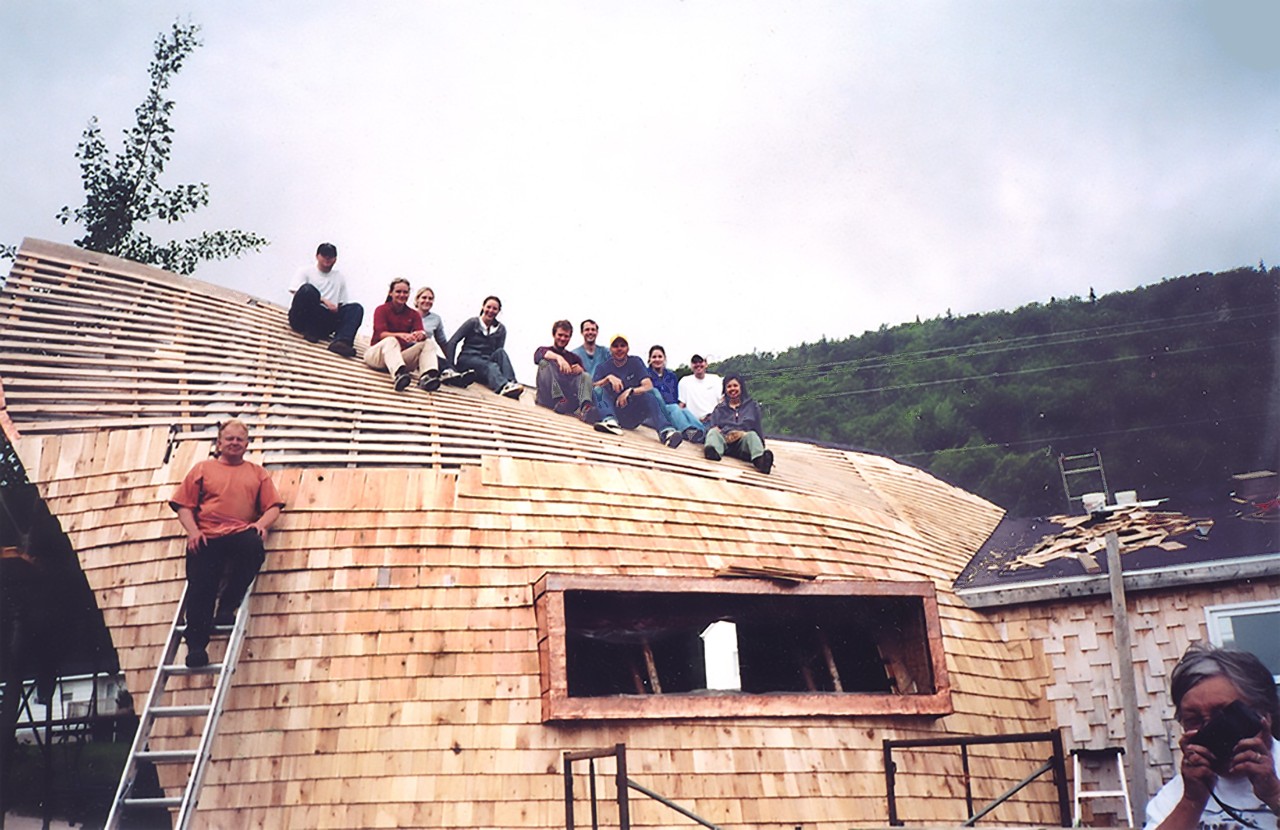Posted: May 19, 2023
By: Jessica Farrell
For Giving Power
 Albert and Murdena Marshall, namesakes of a new student bursary, shared their home, time and knowledge with members of the Dalhousie community for more than 30 years. (Submitted photo)
Albert and Murdena Marshall, namesakes of a new student bursary, shared their home, time and knowledge with members of the Dalhousie community for more than 30 years. (Submitted photo)
For three decades, Mi’kmaw Elders Albert and the late Murdena Marshall welcomed Dalhousie Faculty of Architecture and Planning students into their home in Eskasoni, Unama’ki (Cape Breton Island). Together, they shared their time and knowledge about the Indigenous ways of building and the concept of Etuaptmumk — Two-Eyed Seeing.
This Mi’kmaw guiding principle allows us to learn from both Indigenous knowledge and ways of knowing, in conjunction with western knowledge and ways of knowing, to gain a greater understanding of the world around us for the benefit of all.
“This is something that sustained our ancestors for generations,” says Albert. “It’s something that could be integrated into the modern context and still maintain its integrity.”
“The experience of working with Albert and Murdena in Eskasoni was often the first experience students had of any First Nation culture in Canada,” adds Richard Kroeker, Professor Emeritus at Dalhousie’s School of Architecture. “Students learned about the long, deep history of this environment and our place within it, weighing the long-term consequences of our activities for the balance and harmony of the natural community, as a practical, ethical guide to how we act as designers.”
Bringing more Mi’kmaw knowledge — and students — to the design professions
The design professions — architecture, planning and engineering — play pivotal roles in defining our communities, and allow students the opportunity to help shape the world in which they live. Incorporating Mi’kmaw ways of knowing and interpreting the world opens the door to new possibilities and more sustainable ways of configuring our communities.
“[The] Mi’kmaq are the original culture of this region, with a deep history in this place, a rich language, and a collective consciousness rooted in notions of equality of all members of society and all beings within nature,” explains Kroeker.
 Professor Emeritus Richard Kroeker (left) on site with Dalhousie Architecture and Planning students, with Murdena Marshall snapping a candid photo (right). (Submitted photo)
Professor Emeritus Richard Kroeker (left) on site with Dalhousie Architecture and Planning students, with Murdena Marshall snapping a candid photo (right). (Submitted photo)
Coming together
Kroeker asked former students, alumni and friends to support the Murdena & Albert Marshall Bursary, which he established at Dalhousie in 2021. The fund will provide financial support to Mi’kmaw students pursuing a degree in the design professions, with the hope of increasing the number of Mi’kmaq students in these programs where they have traditionally been underrepresented.
“Thanks to the contributions of alumni, and many who got to know Albert and Murdena during their student years, the fundraising has had great success in reaching the initial goal of activating the bursary,” says Kroeker. “As funds continue to grow to address student costs, we are also working to recruit future students from Mi’kmaw communities to the design professions, making them aware of available opportunities.”
Through the generosity of more than 30 donors to date, this peer-to-peer fundraising project has exceeded its initial $25,000 goal, allowing the bursary to be awarded in Murdena and Albert’s honour in perpetuity.
“The Dalhousie community acknowledges that we are all treaty people,” says Dr. Graham Gagnon, Dean of the Faculty of Architecture and Planning. “Through this acknowledgment, our alumni and donor communities aim to inspire future learners at Dalhousie to embrace Etuaptmumk in future designs and ways of knowing.”
Looking forward
Albert continues to engage with students, actively promoting his culture, environmental values and awareness to help shape how we build and plan our world.
“If we were to humble ourselves and embrace this concept of Two-Eyed Seeing to help us to mitigate some of those mistakes that have been made and that we are making, I believe we will then be able to say ‘I fulfilled my human responsibilities, why I was placed here,’” explains Albert.
Continuing the critical work he and Murdena began, Albert encourages others to think about how we can come together as one, to begin crafting how this world should look and to consider how every person can have a role and bring forth any gifts they may have.
“During my years of teaching, I taught many students from cultural traditions from around the globe, but I never had a Mi’kmaw student,” says Kroeker. “We need to remove the barriers that have kept Mi’kmaw young people from accessing the design professions and create positive opportunities.”
The Murdena & Albert Marshall Bursary has demonstrated that many people coming together with a common goal can help make a big difference and impact change. The inaugural bursary will be awarded in 2023.